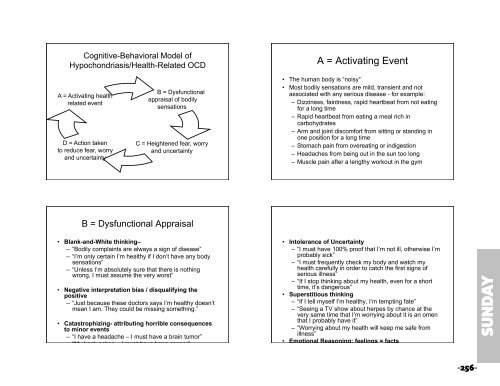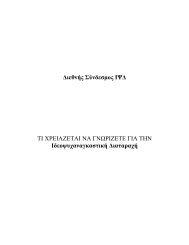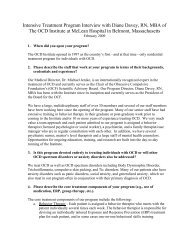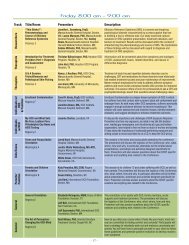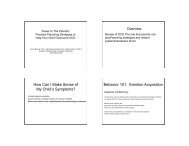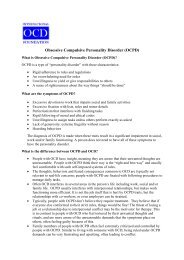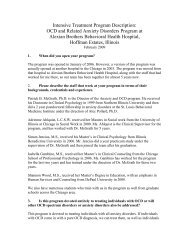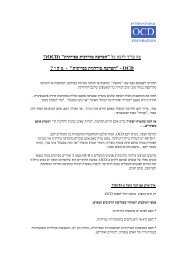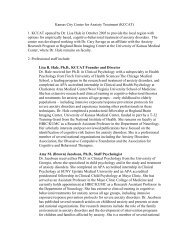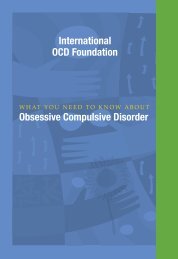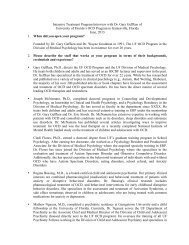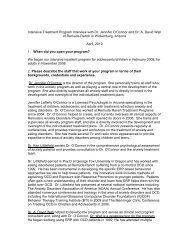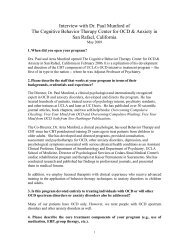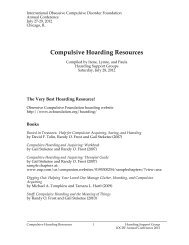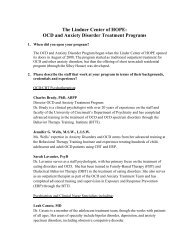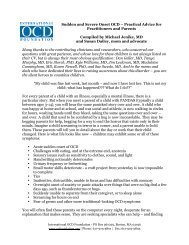perfectionism and - Obsessive-Compulsive Foundation
perfectionism and - Obsessive-Compulsive Foundation
perfectionism and - Obsessive-Compulsive Foundation
You also want an ePaper? Increase the reach of your titles
YUMPU automatically turns print PDFs into web optimized ePapers that Google loves.
6/14/13<br />
Cognitive-Behavioral Model of<br />
Hypochondriasis/Health-Related OCD<br />
A = Activating health<br />
related event<br />
D = Action taken<br />
to reduce fear, worry<br />
<strong>and</strong> uncertainty<br />
B = Dysfunctional<br />
appraisal of bodily<br />
sensations<br />
C = Heightened fear, worry<br />
<strong>and</strong> uncertainty<br />
• The human body is “noisy”<br />
• Most bodily sensations are mild, transient <strong>and</strong> not<br />
associated with any serious disease - for example:<br />
– Dizziness, faintness, rapid heartbeat from not eating<br />
for a long time<br />
– Rapid heartbeat from eating a meal rich in<br />
carbohydrates<br />
– Arm <strong>and</strong> joint discomfort from sitting or st<strong>and</strong>ing in<br />
one position for a long time<br />
– Stomach pain from overeating or indigestion<br />
– Headaches from being out in the sun too long<br />
– Muscle pain after a lengthy workout in the gym<br />
B = Dysfunctional Appraisal<br />
• Blank-<strong>and</strong>-White thinking–<br />
– “Bodily complaints are always a sign of disease”<br />
– “I’m only certain I’m healthy if I don’t have any body<br />
sensations”<br />
– “Unless I’m absolutely sure that there is nothing<br />
wrong, I must assume the very worst”<br />
• Negative interpretation bias / disqualifying the<br />
positive<br />
– “Just because these doctors says I’m healthy doesn’t<br />
mean I am. They could be missing something.”<br />
• Catastrophizing- attributing horrible consequences<br />
to minor events<br />
– “I have a headache – I must have a brain tumor”<br />
– “My back aches – I must have bone cancer”<br />
• Intolerance of Uncertainty<br />
– “I must have 100% proof that I’m not ill, otherwise I’m<br />
probably sick”<br />
– “I must frequently check my body <strong>and</strong> watch my<br />
health carefully in order to catch the first signs of<br />
serious illness”<br />
– “If I stop thinking about my health, even for a short<br />
time, it’s dangerous”<br />
• Superstitious thinking<br />
– “If I tell myself I’m healthy, I’m tempting fate”<br />
– “Seeing a TV show about herpes by chance at the<br />
very same time that I’m worrying about it is an omen<br />
that I probably have it”<br />
– “Worrying about my health will keep me safe from<br />
illness”<br />
• Emotional Reasoning: feelings = facts<br />
SUNDAY<br />
-256-<br />
6


